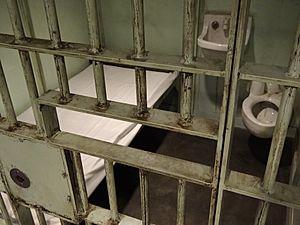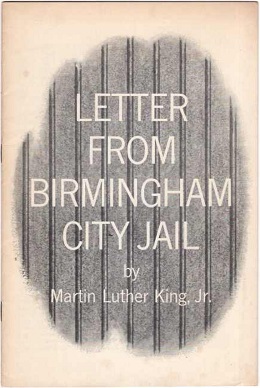Letter from Birmingham Jail facts for kids

The "Letter from Birmingham Jail" is a famous letter written by Martin Luther King Jr. on April 16, 1963. It is also known as the "Letter from Birmingham City Jail." In this letter, King explained why people should stand up against unfair laws. He believed it was important to take direct action for justice. He felt that waiting for justice to happen on its own could take too long.
King wrote the letter while he was in jail in Birmingham, Alabama. He was responding to a statement called "A Call for Unity" from some local clergymen. They had criticized his actions. King's letter became a very important document for the Civil Rights Movement. It is seen as a classic example of civil disobedience, which means peacefully refusing to obey certain laws.
Contents
Why Martin Luther King Jr. Wrote the Letter
Birmingham's Fight for Equality
Birmingham, Alabama was a city known for its strict racial segregation. This meant Black and white people were kept separate by law. Many people in Birmingham were actively fighting against this racism. Their strong efforts caught the attention of Martin Luther King Jr. He felt Birmingham was the right place to begin his work for change.
King's Meeting with President Kennedy
On October 16, 1963, King met with President John F. Kennedy. King wanted to discuss the serious problem of discrimination in the Southern states. He also wanted to talk about the government's slow response. President Kennedy seemed to support ending segregation. However, he was not taking quick action. King was very passionate about making changes. So, he started "Project C," which stood for "confrontation."
The Birmingham Campaign and King's Arrest
The Birmingham campaign began on April 3, 1963. It involved peaceful marches and sit-ins. These actions were against racism and segregation in Birmingham. On April 10, a judge issued an order against these protests. The order banned parading, demonstrating, and picketing.
Leaders of the campaign, including King, decided to disobey this order. They believed the order was unfair. On April 12, King was arrested during a protest. He was then taken to the Birmingham jail.
"A Call for Unity"
While King was in jail, a friend secretly gave him a newspaper. The newspaper from April 12 contained "A Call for Unity." This was a statement written by eight white religious leaders in Alabama. They criticized King and his methods of protest. This statement made King decide to write his famous letter in response. Walter Reuther, who led the United Auto Workers, helped by raising money. He arranged $160,000 to bail King and other jailed protestors out of prison.
How the Letter Was Published
Writing the Letter in Jail
Martin Luther King Jr. started writing his letter on the edges of the newspaper he had. This was the only paper he could get. Later, a trusted jail worker gave him small pieces of paper. King wrote more on these scraps. He then gave them to his lawyers. The lawyers took the papers back to the civil rights headquarters.
Pastor Wyatt Tee Walker and his secretary, Willie Pearl Mackey, put all the pieces together. They worked to organize and edit the letter. Eventually, King was able to finish the entire letter on a pad of paper. His lawyers were allowed to leave this pad with him.
Spreading the Message
An editor from The New York Times Magazine asked King to write his letter for their publication. However, the Times decided not to publish it. Large parts of the letter were published without King's permission on May 19, 1963. This happened in the New York Post Sunday Magazine.
The full letter was first published in May 1963. It was called "Letter from Birmingham City Jail" by the American Friends Service Committee. It then appeared in other magazines like Liberation and The Christian Century in June 1963. The letter became even more popular as the summer went on. It was reprinted in The Progressive and The Atlantic Monthly. King also included a version of the letter in his 1964 book, Why We Can't Wait.
The letter was reprinted many times. It appeared in about 50 different collections of readings. These collections were used for college writing classes between 1964 and 1968.
U.S. Senator Doug Jones from Alabama led a yearly reading of the letter. This reading took place in the U.S. Senate in 2019 and 2020. After he left office, Senator Sherrod Brown from Ohio continued this tradition.
See also
 In Spanish: Carta desde la cárcel de Birmingham para niños
In Spanish: Carta desde la cárcel de Birmingham para niños


